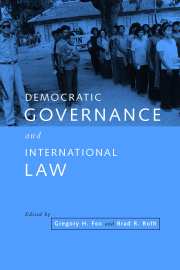Book contents
- Frontmatter
- Contents
- List of contributors
- List of acknowledgments
- Introduction: the spread of liberal democracy and its implications for international law
- PART I THE NORMATIVE FOUNDATIONS OF A RIGHT TO POLITICAL PARTICIPATION
- 1 Legitimacy and the democratic entitlement
- 2 The right to political participation in international law
- 3 Democracy and the body of international law
- PART II DEMOCRACY AND INTER-STATE RELATIONS
- PART III DEMOCRACY AND THE USE OF FORCE
- PART IV DEMOCRATIZATION AND CONFLICTING IMPERATIVES
- PART V CRITICAL APPROACHES
- Index
3 - Democracy and the body of international law
Published online by Cambridge University Press: 04 May 2010
- Frontmatter
- Contents
- List of contributors
- List of acknowledgments
- Introduction: the spread of liberal democracy and its implications for international law
- PART I THE NORMATIVE FOUNDATIONS OF A RIGHT TO POLITICAL PARTICIPATION
- 1 Legitimacy and the democratic entitlement
- 2 The right to political participation in international law
- 3 Democracy and the body of international law
- PART II DEMOCRACY AND INTER-STATE RELATIONS
- PART III DEMOCRACY AND THE USE OF FORCE
- PART IV DEMOCRATIZATION AND CONFLICTING IMPERATIVES
- PART V CRITICAL APPROACHES
- Index
Summary
AN OUTLINE OF THE PROBLEM
It is often said that democracies do not wage war on each other, and conflict researchers, looking at wars over the last 200 years, have confirmed that this is broadly true. Admittedly, “the clash of conflicting interests between States governed on democratic principles is not necessarily less serious than between those under less popular forms of government.” Democracies seem able, however, to resolve such clashes by means other than war. Perhaps we might “diminish … and finally … extinguish war between nations” by developing international law and international institutions so as to reinforce democratic government, to deter attempts to overthrow it, and even to reinstate it in cases where it has been wrongfully overthrown. So far attempts at collective security have concentrated on the avoidance of international armed conflict, with rather limited concern for the internal conditions within States which are a major cause of war. Perhaps we need some form of collective democratic security?
An initial difficulty, no doubt, is that of definition. There can be different ideals or legitimate versions of democracy: is one particular ideal or version to be externally imposed? On the other hand, international law is already seeking to reach some agreement on an agreed minimum content of, or at least an agreed minimum standard for, democracy. The major human rights treaties spell out in some detail the essentials of democracy, understood as the right of all citizens to participate in the political life of their societies.
- Type
- Chapter
- Information
- Democratic Governance and International Law , pp. 91 - 120Publisher: Cambridge University PressPrint publication year: 2000
- 9
- Cited by



